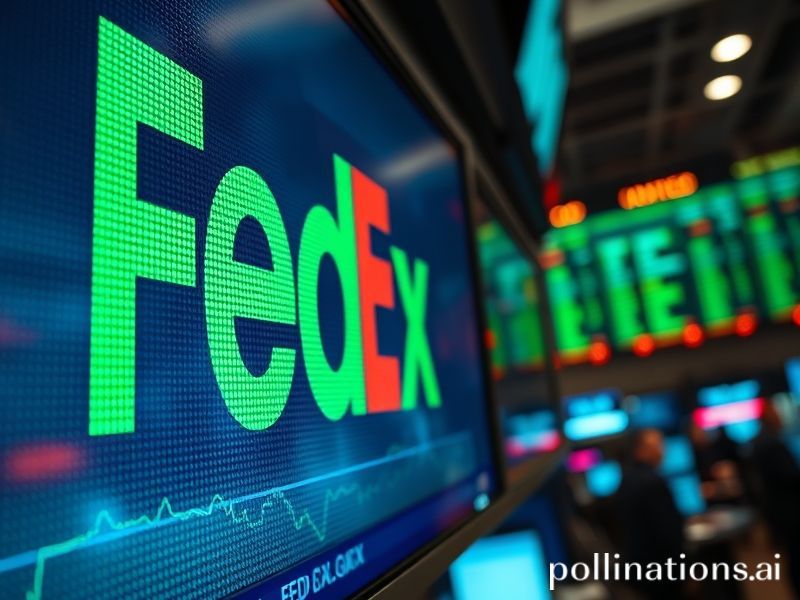FDX Stock: How Your 2 A.M. Online Haul Became a Geopolitical Flashpoint
FDX Stock: When the World’s Packages Become the World’s Problems
By Correspondent-at-Large, Dave’s Locker International Desk
Somewhere above the Pacific, a Boeing 757 with a purple tail is hauling 60 tonnes of iPhone cases, chemotherapy drugs, and a single, inexplicable box marked “live tarantulas—fragile.” Down on the ground, that aircraft is also hauling something weightier: the collective anxiety of investors from Tokyo to Toronto who’ve realized that the fate of global capitalism now rests on the punctual delivery of fidget spinners and insulin. Welcome to the surreal theater where FDX stock (NYSE ticker: FDX, because “FEDEX” was apparently too many letters for the trading floor) moonlights as a barometer for everything from Chinese factory output to German consumer despair.
Let’s begin, as all tragedies do, with numbers. FDX closed last week at $244.73, up a smug 8% after what analysts—professional tea-leaf readers with Bloomberg terminals—called “robust guidance.” Translation: the company promised Wall Street that people will keep panic-buying things they don’t need with money they don’t have, and the planet will continue spinning just fast enough to justify next-day shipping. The stock promptly celebrated by erasing three months of losses incurred when everyone soberly remembered that oil prices occasionally rise above the price of an artisanal latte.
Zoom out and the picture darkens, like a package left on your porch in the rain. FedEx operates 5,000 facilities in 220 countries, which is diplomatic-speak for “we’ve weaponized your compulsive online shopping habit into a multinational empire.” Roughly 40% of revenue comes from outside the United States, meaning FDX is essentially a leveraged bet on humanity’s inability to wait five business days for a garlic press. When the European Central Bank sneezes—say, by raising rates 25 basis points—FDX catches pneumonia, because suddenly every Milanese boutique decides airfreight is a luxury best postponed until the euro stops hyperventilating.
The geopolitical subplot is juicier than a lithium-battery shipment gone rogue. FedEx planes overfly Russian airspace at the Kremlin’s pleasure, a privilege revoked whenever Moscow wants to remind the world that Siberia is large and your supply chain is not. Meanwhile, Chinese customs agents have developed a sport of holding U.S.-bound parcels hostage until someone apologizes for the latest congressional tweet. Each diplomatic tantrum shaves another decimal point off FDX’s guidance, and yet the stock ticks up, because investors have the long-term memory of a goldfish with a TikTok addiction.
Then there’s the green angle, which is less an angle and more an obtuse existential crisis. FedEx has pledged carbon-neutral operations by 2040, a date chosen precisely because most current executives will be sipping piña coladas in whatever corner of the planet still has coconuts. In the meantime, the company is electrifying its fleet at the blistering pace of a sloth on Ambien—20,000 electric vehicles by 2030, or roughly the number of packages Amazon misplaces on a slow Tuesday. Wall Street applauds the ambition while quietly booking profits on oil futures. Hypocrisy, like express shipping, is simply faster when properly funded.
Of course, none of this cosmic absurdity deters pension funds from treating FDX as a “defensive industrial.” The logic: even in a recession, people still need medicine, replacement phone chargers, and novelty socks. It’s the economic equivalent of saying, “Yes, the Titanic is sinking, but shuffleboard is still on the schedule.” And so, from Singapore sovereign wealth funds to Norwegian oil pensions, capital pools on which future retirees depend are lashed to the timely arrival of artisanal beard oil in Des Moines. What could possibly go wrong?
In the end, FDX stock is less a financial instrument and more a darkly comic referendum on modernity itself: our addiction to speed, our talent for outsourcing consequences, our touching faith that the sky will always be open for commerce. Buy the dip, hold the moral high ground, or simply track your package—whatever helps you sleep while the world hurtles through the night at 550 knots, piloted by caffeine and quarterly targets. Just pray the tarantulas arrive intact; the next earnings call depends on it.







